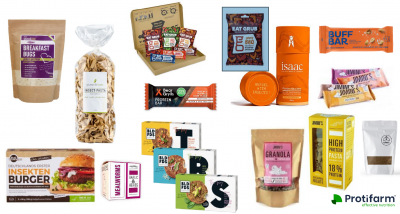The flavour being blown a raspberry by plant-based eaters

Blue raspberry is the flavour shunned by plant-based consumers, according to consumer analytics company Social Standards in its 2019 consumer insights report looking at plant-based food and beverages.
The company, which aggregates global data from around 7 million public consumer posts on social media a day, said chickpeas, jackfruit, chia, quinoa, cashew nuts, maca and spirulina were all high on the index of preferred ingredients and flavours among plant-based consumers.
Blue raspberry, however, a common flavoring for confectionery, snack foods, syrups, and soft drinks, under indexed at 0.3x suggesting “it may be too artificial for plant-based consumers palates”, said the report.
Doing it for the gram
Neither was salad high on the list. “Instagram-worthy options” such as tofu scrambles and Buddha bowls and acia bowls were more likely to appeal to plant-based consumers than to the average food and beverage customer.
Consumer references to ‘plant-based’ are on the rise, with steady growth over the past year, noted the report. At its peak in January 2019, new consumers accounted for 43% of plant-based conversations, a figure that has held more or less steady for about a year. “That represents a major opportunity for brands, as new consumers likely aren’t loyal to specific plant-based products yet,” it said.
Vegan vs plant-based
Interestingly, the data showed growing differentiation between vegan and plant-based consumer segments, with plant-based consumers talking 0.7% less about vegan topics while vegan consumers were talking 2.1% less about plant-based topics – suggesting that not everyone who is eating-plant based foods is a vegan in the strict sense of the word.
More unsurprisingly was that while a variety of concerns motivate plant-based eating, animal welfare, health and sustainability were the most prevalent. Taken as a whole, consumers’ health-related motivations for plant-based eating fell into two main categories: improving heart and gut health.
A look at peoples’ pastimes discovered that 90th percentile also enjoyed ‘juicing and souping’ and the 85th percentile were into yoga.
Trends to watch: fasting and hemp
The report identified fasting as a new trend to watch. Plant-based consumers over-index with both fasting (1.8x) and intermittent fasting (1.5x) compared to the average food and beverage consumer, it noted. Cannabis was another growing trend among plant-based consumers, over-indexing at a rate of 2.7x compared to the average food and beverage consumer. “But CBD isn’t driving that interest,” said the report. “Digging deeper reveals that the relationship is based on plant-based consumers’ affinity for hemp products, which is twice as strong as their interest in CBD.”
Alt-meat trend is ‘too early to call’
Meanwhile, Social Standards questioned if meat alternatives are a firm trend. “Consumer retention is steady, but significantly lower than that of similar categories like non-dairy milk,” it said. “We think it’s too early to call just yet, but we’ll be keeping an eye on it.”
When it came to plant-based meat brands, Beyond Meat was the clear category winner in terms of online conversations. However, Impossible Foods is a rising challenger that has seen some serious growth in the last several months.
In terms of traditional meat substitutes, both veggie and bean burgers are down 12% year-on-year, according to the report, while consumers talk about tofu five times more than veggie burgers. Conversations about seitan and jackfruit as meat substitutes has risen is up 28% YoY, while jackfruit saw a 17% respectively.
The plant-based trend isn’t going away
“Plant-based eating is no longer a niche lifestyle, it’s a wave that’s taking over the entire Food & Beverage industry,” the report concluded. “By understanding the trajectory of the trend, the consumer segments embracing it, and the motivations driving them to eat more plants, brands can better align their product offerings and positioning with changing customer tastes.
“The plant-based revolution isn’t going anywhere. Keeping up with the trend means using data to validate instincts honed by industry experience and to discover insights about new developments on the horizon.”

























